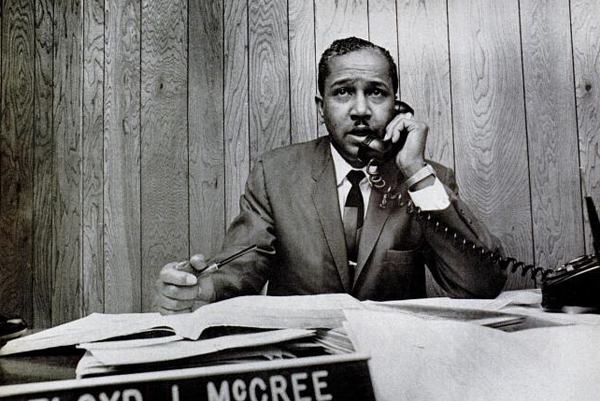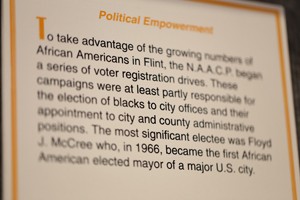Was Flint's Floyd McCree the First Black Mayor in the United States? UM-Flint History Department Brings Clarity to the Question

Floyd J. McCree became the mayor of Flint, Michigan in 1966, making him one of the first African American mayors in the United States since the Reconstruction era. But why "one of the first?" Surely there has to be a definitive timeline and a clear-cut first. And if that is Flint's Mayor McCree, this community and indeed the whole country ought to know and celebrate that achievement. UM-Flint's Wyatt Professor of U.S. History Thomas Henthorn, Ph.D. examined the history and nuance of how Mayor McCree's milestone is remembered.
Henthorn underscored the significance of McCree's life and legacy, regardless of the exacting wording historians must use to describe events like McCree's mayorship. "It starts to demonstrate the growing power and importance of the black electorate," Henthorn said.
The answer to the question "who is the first black mayor in U.S. history?" depends on a few key considerations.
Immediately following the Civil War, during the Reconstruction era, at least two African Americans were elected as mayors: Pierre Caliste Landry in Donaldsonville, Louisiana and W.B. Scott in Maryville, Tennessee. Historians like Henthorn recognize that there could have been others. Municipal records get lost or may not have been kept in the first place. Henthorn said it is important for historians to acknowledge uncertainties where they do—or could—exist. This openness encourages additional research and investigation.
After Reconstruction, it would be nearly a hundred years before another African American would become mayor of a U.S. city.
So who was the first black mayor in the U.S. after Reconstruction?
Henthorn said historians of local politics must consider the full context of such a question. To more fully understand "the growing power and importance of the black electorate," it is important to distinguish between mayors who were popularly elected and those appointed mayor from city commissions (or councils) by the vote of fellow members. It is thought that winning by the popular vote of the people suggests a more widespread, more democratic assurgency.
But a democratically elected body voting for one of its members to be mayor is also a democratic process, one by which cities throughout the country continue to select mayors. Flint's Floyd McCree and Springfield, Ohio's Robert Clayton Henry both became their city's mayor in this way in 1966.
The first popularly elected African American mayor of a major U.S. city was Richard Hatcher of Gary, Indiana (1966). He was elected before Cleveland, Ohio's Carl Stokes, but officially took office after Stokes was sworn in (1967). So Carl Stokes is considered the first popularly elected African American sworn in as mayor of a major U.S. city.
Similar to the way Hatcher and Stokes can be said to share the honor of first popularly elected (and first sworn in) African American mayor, Flint's McCree and Springfield's Henry can both claim a mayoral "first."
As noted, McCree and Henry both became mayor by the vote of fellow city commissioners in 1966. In consultation with a colleague at Wright State University in Ohio, Henthron confirmed that Robert Clayton Henry's appointment occurred in January of 1966, McCree's in November. Henthorn said that means this "preliminary scan of the data tilts in the direction of Henry, not McCree, as the first black mayor since Reconstruction."
However, the Flint Journal and others still cite McCree as "first black mayor of a major American city." The key consideration in this formulation is "of a major American city."

According to the U.S. Census, Flint was the 62nd largest city in the country in 1960. Its population was 196,940, larger than Sacramento CA, Salt Lake City UT, and Austin TX. At that time, Flint's population was more than double that of Springfield's 82,723. If qualification as a "major U.S. city" is a population of 100,000+, Flint's Floyd McCree is the "first African American mayor of a major U.S. city since Reconstruction."
From his perspective as an historian, Henthorn is most comfortable referring to Flint's Floyd J. McCree as "Michigan's first black mayor."
In the end, setting aside all qualifiers, the accomplishments of all these men are worthy of our attention, respect, and celebration.
Related Posts
No related photos.
- College of Arts, Sciences & Education
- College Town
- Community
- Financial Aid and Tuition
- Giving
- History
- University News
UM-Flint News
The Office of Marketing & Communications can be reached at [email protected].